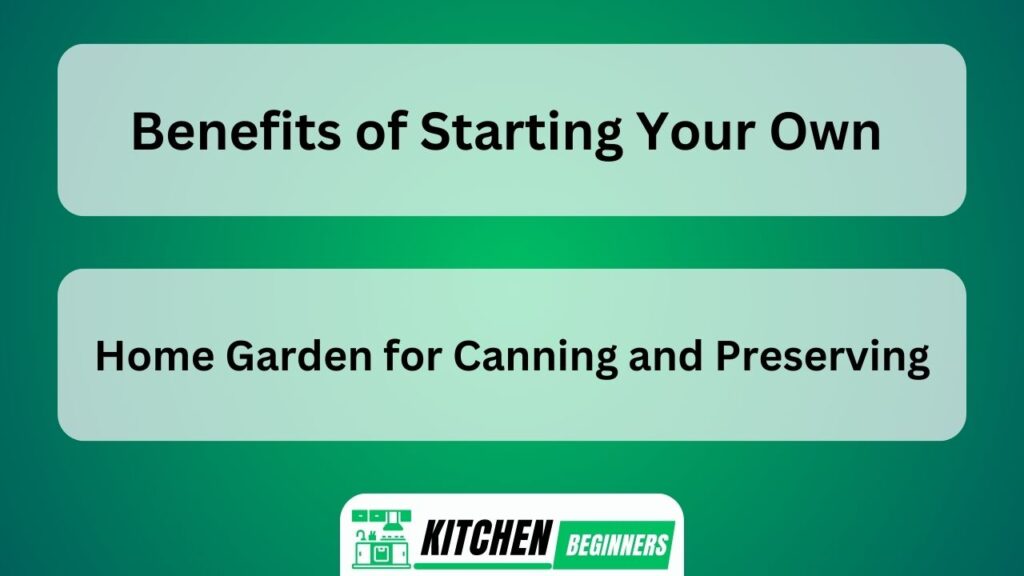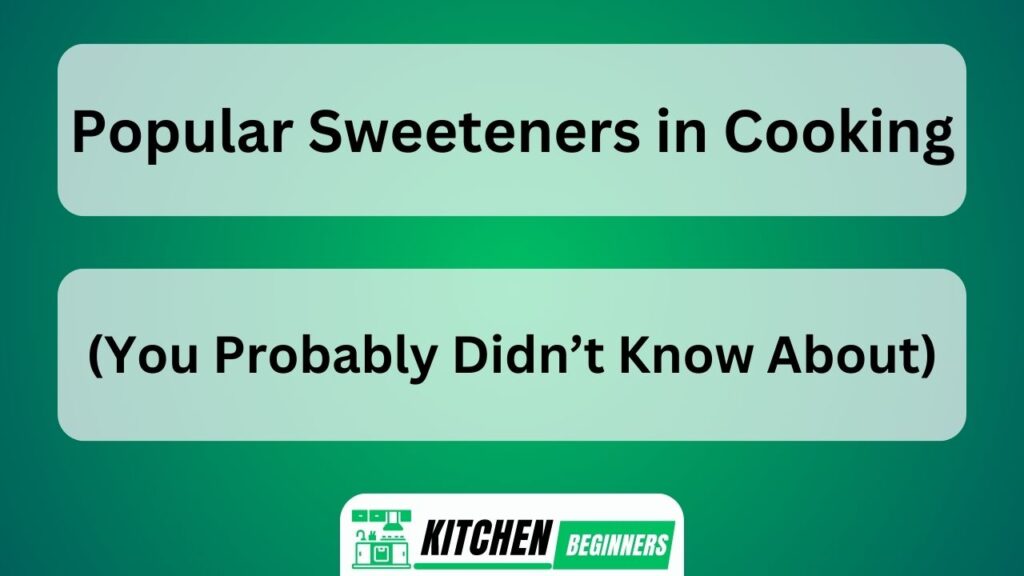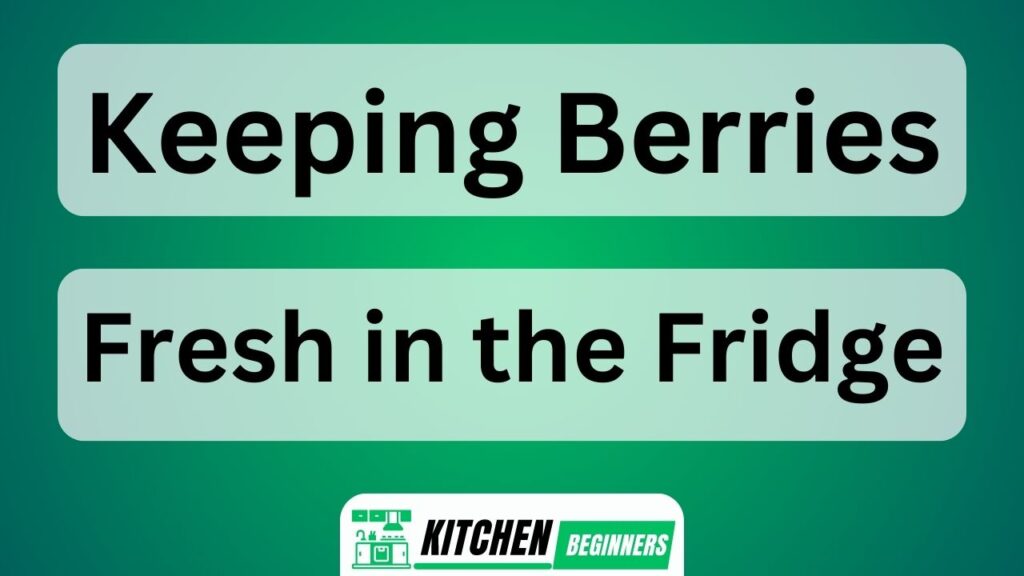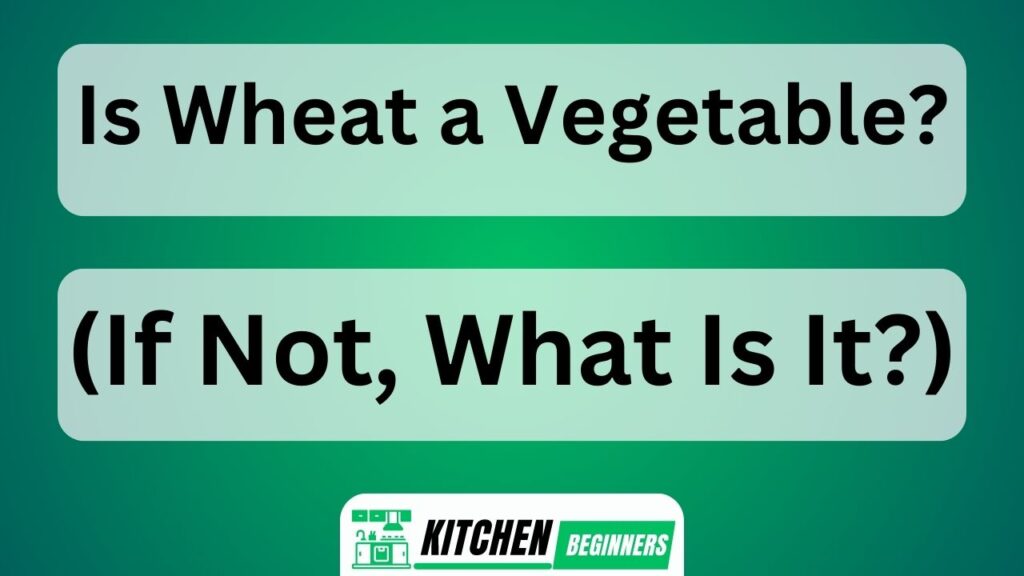Are you ready to embark on a journey that will not only nourish your body, but also feed your soul?
Imagine stepping into your own backyard oasis, where the vibrant colors and enticing scents of fresh produce surround you. With just a little effort and some dirt under our fingernails, we can experience the countless benefits of starting our own home garden for canning and preserving.
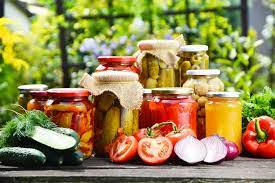
From improved health to cost savings and even community connection, the rewards are endless.
So grab your gardening gloves and let’s dig in!
Key Takeaways of Benefits of Starting Your Own Home Garden for Canning and Preserving
- Health benefits and cost savings
- Fresh and organic produce
- Healthier food options
- Positive environmental contributions
Health Benefits
Starting your own home garden can provide us with a variety of health benefits. One of the key advantages is improved well-being. Gardening allows us to connect with nature, which has been shown to reduce stress levels and promote overall mental health. The physical activity involved in gardening also helps to improve cardiovascular health and increase flexibility and strength.
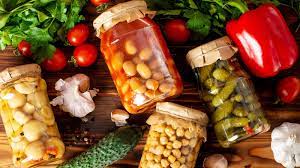
Additionally, having our own home garden gives us the opportunity to grow fresh fruits and vegetables, which are essential for a healthy diet. Consuming these fresh produce not only provides us with essential nutrients but also helps in disease prevention. Studies have shown that a diet rich in fruits and vegetables can lower the risk of chronic diseases such as heart disease, diabetes, and certain types of cancer.
Cost Savings
Save money by growing your own produce in a home garden and preserving it through canning. Not only does this allow you to enjoy fresh, organic fruits and vegetables all year round, but it also helps you save on grocery bills.
Here are some reasons why home gardening and food preservation can be cost-effective:
- Reduced grocery expenses:
- By growing your own fruits and vegetables, you eliminate the need to purchase them from the store.
- Canning allows you to preserve excess produce, preventing waste and ensuring that nothing goes to waste.
- Long-term savings:
- When you have a bountiful harvest, canning allows you to stock up on preserved foods for future use.
- By buying produce in bulk or during sales seasons, you can take advantage of lower prices.
Fresh and Organic Produce
When it comes to fresh and organic produce, there are several key points to consider.
Firstly, growing our own fruits and vegetables at home allows us to have control over what goes into our food. This ensures that it is free from harmful pesticides and chemicals.
Secondly, cultivating our own garden can lead to significant cost savings. We no longer need to rely on store-bought produce, which can be expensive. By growing our own, we can save money and have access to fresh and nutritious food.
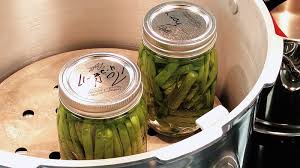
Thirdly, adopting sustainable gardening practices is important. This includes composting and water conservation. By doing so, we contribute to a healthier planet. Additionally, these practices make us more self-sufficient in meeting our dietary needs.
Healthier Food Options
If you grow your own fruits and vegetables in a home garden, you’ll have access to healthier food options for canning and preserving. This offers numerous health benefits as well as cost savings potential.
Here’s why:
- Health Benefits:
- Freshness: Homegrown produce is picked at its peak ripeness, ensuring maximum nutrient content.
- Organic: By using natural fertilizers and pesticides or opting for organic gardening methods, you can avoid harmful chemicals often found in store-bought produce.
- Cost Savings:
- Lower Grocery Bills: Growing your own fruits and vegetables reduces the need to purchase them from stores regularly.
- Preservation Techniques: Canning and preserving excess produce helps extend their shelf life, allowing you to enjoy your harvest throughout the year.
Cost Savings Potential
To maximize your savings, consider growing your own fruits and vegetables in a home garden. Not only will you have access to fresh, organic produce, but you can also save money on grocery bills and food preservation.
By growing your own ingredients, you eliminate the need to purchase them from stores or farmers’ markets. This means that you can avoid the rising costs of food and instead rely on your own homegrown produce for canning and preserving. Whether it’s making homemade jams, pickles, or sauces, using homegrown ingredients ensures that you have complete control over what goes into your preserved foods.
Plus, by growing your own fruits and vegetables, you can harvest in abundance during peak seasons when prices tend to be higher at stores.
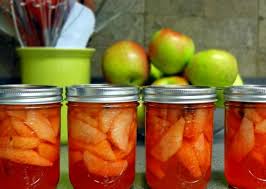
Transitioning into the next section on sustainability and self-sufficiency…
Sustainability and Self-Sufficiency
By embracing sustainable practices and focusing on self-sufficiency, we can reduce our reliance on external resources and become more environmentally conscious. Sustainable living involves making choices that support the health of both ourselves and the planet.
When it comes to home gardening for canning and preserving, there are several ways in which sustainability and self-reliance intersect.
- Growing our own fruits, vegetables, and herbs allows us to have a direct connection to our food source. We can control what goes into our plants, avoiding harmful pesticides or chemicals. By reducing transportation miles from farm to table, we lessen our carbon footprint.
- Canning and preserving our harvest helps minimize food waste. We can enjoy the flavors of summer year-round while reducing packaging waste. Preserving excess produce strengthens our self-reliance by providing food security during uncertain times.
Through sustainable living practices like home gardening for canning and preserving, we not only benefit personally but also contribute positively to the environment.
Control Over Pesticides and Chemicals
Having control over the pesticides and chemicals used in our home garden allows us to prioritize the health and well-being of our family. We believe in growing pesticide-free produce using organic gardening techniques, which not only benefits our loved ones but also the environment. By avoiding synthetic pesticides and opting for natural alternatives like companion planting, crop rotation, and organic fertilizers, we can ensure that the fruits and vegetables we harvest are safe to consume. To give you a better understanding of the benefits of organic gardening, take a look at the table below:
| Organic Gardening Techniques | Benefits |
|---|---|
| Companion Planting | Natural pest control by attracting beneficial insects or repelling pests |
| Crop Rotation | Reduces soil-borne diseases and nutrient depletion |
| Organic Fertilizers | Feeds plants with natural nutrients without harmful chemical residues |
With these practices in place, we can enjoy homegrown produce that is both delicious and free from harmful chemicals.
Sustainability and Environmental Impact
When it comes to gardening, we believe in practicing eco-friendly techniques that have a positive impact on the environment. Our goal is to minimize harm to the ecosystem by avoiding the use of harmful pesticides and chemicals.
Eco-Friendly Gardening Practices
Using eco-friendly gardening practices in our home garden can greatly reduce our carbon footprint. Here are some key practices to consider:
- Composting: By composting kitchen scraps and yard waste, we can create nutrient-rich soil amendments without relying on chemical fertilizers.
- Water conservation: Implementing techniques such as drip irrigation, mulching, and rainwater harvesting can help conserve water and minimize waste.
- Drip irrigation: This method delivers water directly to the plant’s roots, reducing evaporation and ensuring efficient use.
- Mulching: Applying organic mulch around plants helps retain moisture, suppress weeds, and regulate soil temperature.
- Organic pest control: Instead of using harmful pesticides, we can opt for natural alternatives like companion planting, beneficial insects, and homemade sprays.
Positive Environmental Contributions
By implementing these eco-friendly gardening practices, we can actively contribute to positive environmental changes and conservation efforts.
One way to make a positive impact is by using organic fertilizers instead of synthetic ones. Organic fertilizers are made from natural materials such as compost or manure, which not only provide nutrients to the plants but also improve soil health and reduce chemical runoff into waterways.
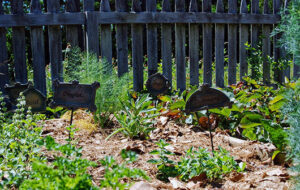
Another practice is companion planting, where different plants are grown together to enhance pest control and nutrient uptake. This reduces the need for pesticides and chemical fertilizers, promoting a healthier ecosystem.
Additionally, practicing water conservation techniques like mulching can help conserve water by reducing evaporation and maintaining soil moisture levels.
These small steps may seem insignificant, but when combined, they can collectively make a significant difference in our environment.
Accessibility of Homegrown Food
You can easily access and enjoy the fresh produce from your own home garden. Having a garden right outside your door offers numerous accessibility benefits for you and your family, while also contributing to food security.
Here are some reasons why starting a home garden is an excellent choice:
- Convenience:
- You have immediate access to a wide variety of fruits, vegetables, and herbs without having to travel to the grocery store.
- Harvesting your own produce ensures that you always have fresh ingredients at hand.
- Cost-effectiveness:
- Growing your own food can significantly reduce your grocery bill, saving you money in the long run.
- By preserving surplus crops through canning or other methods, you can extend their shelf life and enjoy them throughout the year.
Preservation of Seasonal Produce
When it comes to preserving seasonal produce, it’s important to consider different methods that can extend the shelf life of your fruits and vegetables. One popular method is seasonal canning, which allows you to enjoy the flavors of summer all year round.
By making your own homemade preserves, you have full control over the ingredients used and can avoid any unnecessary additives or preservatives. Plus, it’s a great way to reduce food waste by using up excess produce from your garden.
The process involves cooking the fruits or vegetables with sugar and acid, then sealing them in sterile jars for long-term storage. Homemade preserves not only taste delicious but also offer nutritional benefits, as they retain much of the vitamins and minerals found in fresh produce.
Customization and Personalization
If you want to add a personal touch to your preserves, try experimenting with different flavors and spices. This is one of the many customization options available when it comes to canning and preserving. By adding unique ingredients, you can create preserves that suit your taste preferences perfectly.
Here are some ideas to get you started:
- Flavored syrups: Infuse your preserves with hints of vanilla, cinnamon, or even lavender for a delightful twist.
- Spicy kick: Add a pinch of chili flakes or a dash of hot sauce to give your preserves an extra zing.
Not only do these customization options allow you to tailor your preserves to your liking, but they also establish a personal connection between you and the food you make. It’s all about creating something unique and special that reflects your own tastes and preferences. So go ahead and get creative in the kitchen!
Learning and Skill Development
Exploring different flavors and experimenting with various spices in homemade preserves not only enhances taste profiles but also develops valuable skills in the process. When we start our own home garden for canning and preserving, we open ourselves up to a world of learning opportunities and skill building. Not only do we learn about different types of fruits and vegetables, their growing seasons, and the best methods for harvesting them, but we also acquire knowledge about food preservation techniques such as canning, pickling, and fermenting. Additionally, we develop skills in planning and organizing our garden space, managing pests and diseases naturally, and creating delicious recipes using our preserved produce. It’s a hands-on experience that allows us to gain practical skills while enjoying the satisfaction of producing our own food.
| Learning Opportunities | Skill Building |
|---|---|
| Identifying ripe produce | Canning |
| Harvesting techniques | Pickling |
| Preserving methods | Fermenting |
| Garden planning | Recipe creation |
Community and Social Connection
Now that we’ve covered the learning and skill development aspect of starting your own home garden for canning and preserving, let’s explore another rewarding facet – community and social connection.
When you dive into this hobby, you’ll find yourself becoming part of a vibrant network that shares your passion for gardening and preserving. Here are some ways in which your home garden can foster social connections and community engagement:
- Garden clubs: Joining a local garden club allows you to meet fellow enthusiasts, exchange tips, and even swap produce.
- Community gardens: Participating in a community garden not only provides access to shared resources but also creates opportunities for collaboration with neighbors who share similar interests.
Through these avenues, you can forge meaningful connections, learn from others’ experiences, contribute to the community’s well-being, and create lasting friendships centered around your mutual love for gardening and preserving.
Frequently Asked Questions
How Much Time Does It Typically Take to Maintain a Home Garden for Canning and Preserving?
Maintaining a home garden for canning and preserving requires a significant time commitment. However, with some tips and tricks, the process can be more efficient. We’ll provide you with detailed insights on managing your garden effectively.
Can I Start a Home Garden if I Live in an Apartment or Have Limited Outdoor Space?
Yes, we can start a home garden even with limited outdoor space or in an apartment. Indoor gardening allows us to grow plants and herbs on windowsills, balconies, or even using vertical spaces.
Are There Any Specific Types of Fruits or Vegetables That Are Easier to Grow and Can for Beginners?
For beginners looking to grow fruits and vegetables for canning and preserving, there are some easy options. Tomatoes, zucchini, and strawberries are great choices. Learn the best techniques for canning and preserving these delicious crops.
What Are Some Common Challenges or Problems That I May Encounter When Starting a Home Garden for Canning and Preserving?
When starting a home garden for canning and preserving, we may encounter common challenges like dealing with pests and limited space. These obstacles can be overcome with proper planning, pest control measures, and creative use of available space.
Are There Any Specific Tools or Equipment That I Will Need to Invest in to Get Started With Home Canning and Preserving?
To get started with home canning and preserving, we’ll need specific tools and equipment. Proper equipment is crucial for safely preserving food. Some essentials include a pressure canner, water bath canner, jars, lids, and a canning funnel.
Conclusion
In conclusion, starting your own home garden for canning and preserving is not only a practical choice but also an emotionally fulfilling one.
It allows us to reconnect with nature, nourish our bodies with fresh and organic produce, and take control over what goes into our food.
By preserving seasonal produce, we can enjoy the flavors of summer all year round. Moreover, the sense of accomplishment and community that comes from sharing homemade preserves is truly priceless.
So why not embark on this journey of self-sustainability and reap the bountiful benefits it offers?
